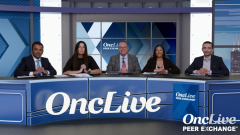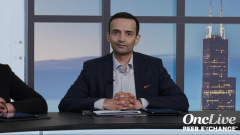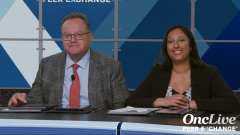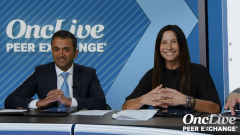
BCMA-Targeting Bispecifics in RRMM: MajesTEC-1 Trial and Real-World Data for Teclistamab
Focusing on relapsed/refractory MM, expert panelists review data from MajesTEC-1 and consider how bispecific antibodies are impacting the treatment paradigm.
Episodes in this series

Transcript:
Ajai Chari, MD: Let’s go to the bispecific antibodies. Rafael, do you want to tell us how these new compounds compare to what we just looked at?
Rafael Fonseca, MD: Yes, I think this is remarkable. At the ASH [American Society of Hematology] meeting I counted the number of agents, either bispecific or CAR [chimeric antigen receptor] T cells that are active, and there are about 15 of them. We have a tsunami of new options coming that depend on the activity of T cells as part of immunotherapy for multiple myeloma. For audience members who don’t know this, the bispecifics, what they do is they directly engage a T cell with a target cell, in this case, a multiple myeloma cell. Many of them target BCMA [B-cell maturation antigen], but we have other targets: GPRC5D, which we’re going to talk about, FcRH5, which is cevostamab; and even CS1 is being looked at. I think we have a plethora of options.
The nice thing about bispecifics, and I think there’s a lot of excitement behind this, is these are synthetic, off the shelf. We have options where we can see a patient in the morning, and the afternoon, the patient is either admitted or started on treatment. I think this will open a lot of new possibilities for patients. I know we have a slide with a summary of them. We’re going to talk about the details. I describe them to my patients; they’re like either matchmakers or double-sided Velcro. They bring together a T cell, which is always a bully, but a T cell on top of something else is going to attack it. That’s what we are able to achieve with the bispecifics. The results are remarkable. I know we’re going to go into the details, but I’m personally very excited about the practicalities of the bispecifics.
Ajai Chari, MD: Krina, with that great introduction, you can tell us a little about the mechanism of action and update us on the MajesTEC-1study we heard about at ASCO [American Society of Clinical Oncology annual meeting]?
Krina Patel MD: Yes, teclistamab, one of our BCMA CAR Ts. We have other antigens, but we have lots of BCMA-targeted bispecifics first, and again, [it] takes the CD3, and the BCMA brings the T cells together, maybe gives them a bit of a fire under their butt, so they can kill the myeloma, but brings them closer in location. I think there were 94 patients or so presented, and the response rate was 63%, 64%. We saw previously [response rates] around 30%. To have a single agent that can hit double the response rate is pretty fantastic. Then, in terms of the duration of response, we actually have that now, we were all waiting for a bit longer follow-up, and it’s 18.4 months, and PFS [progression-free survival] of 11.3 months. It was much better than the 3 to 4 months for all the other patients, so almost 3 times longer now.
I think the bigger thing is, there are different adverse effects than what we are used to. We’ll talk more about it with the other CAR Ts, etc. But 72% of patients had CRS [cytokine release syndrome], but these are mostly all grade 1 or 2, and usually earlier in treatment, and then subside. I think there are new things we need to learn how to take care of, but it’s pretty fantastic that patients are doing really well with it. Then there are infections, of course, but I think it was great to see the PFS and duration of response follow-up this time.
Ajai Chari, MD: I think one of the most eagerly awaited things was this PFS result. Because it’s the first bispecific, we’ve all been seeing those swimmer lane plots, waiting and waiting.
Krina Patel MD: Patients at up to 2 years were still going, but what’s the median?
Ajai Chari, MD: Yes, finally. We’re going to come back to you. I know you love your CAR Ts.
Krina Patel MD: I know.
Ajai Chari, MD: It will be interesting to see what you think about that.
Krina Patel MD: That’s where we’re going to fight, but it’s OK.
Ajai Chari, MD: But before we get to that, it is worth mentioning, one of the challenges. Luckily in the United States, we have an accelerated approval strategy, where if you have an unmet need, historically the benchmark was 20% to 30%, and you could get a new drug approval. But one of the challenges with accelerated approval is you don’t have a control arm, so what’s the context of this? I think here at this year’s ASCO, we had 2 efforts to look at that, one from Europe using the LocoMMotion study, and the other from the American side using the Flatiron [Health] database.
Basically, it was a study to try to compare these real-world patients on both sides of the Atlantic and using matching to try to—because we all know that these bispecific studies, even though less selective than CAR T, are still selective for pretty healthy patients. And when you factor all of those variables in, there was a statistically significant benefit. It’s striking, rarely is it the same on both sides of the Atlantic, but PFS and OS [overall survival] benefit was suggested based on this. I think the FDA usually likes these historical references for accelerated approval to put these drugs into context. I think especially important is that these are not cherry-picked CAR Ts. These are off the shelf, with sick patients. It was nice to see that.
Transcript edited for clarity.








































